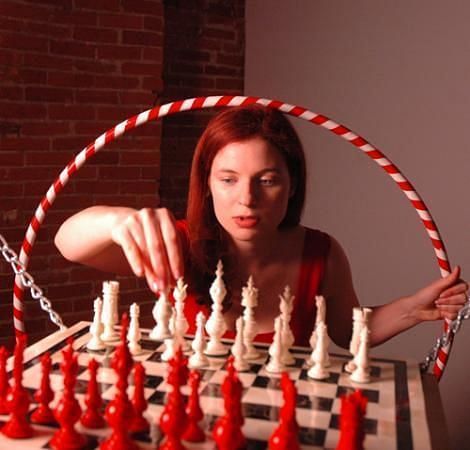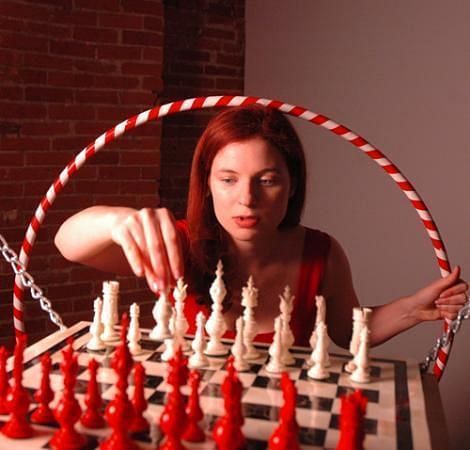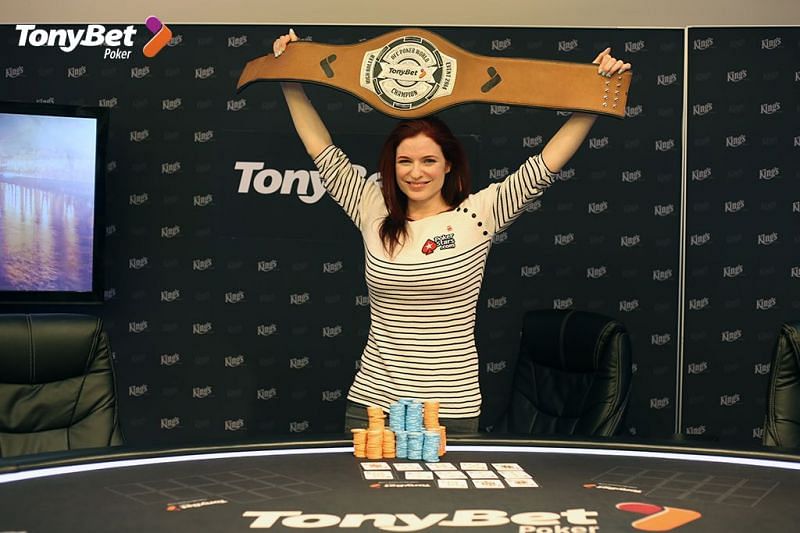
Empowering Women's Chess: In Conversation with WGM Jennifer Shahade
Jennifer Shahade is not only a world-renowned chess competitor, but she is also a famed commentator, writer, and poker player. Learning chess from a very young age, she went on to capture numerous prestigious titles in her career including the U.S. Juniors, U.S. Women's Championships (twice), and many more. She studied at New York University (NYU) and is now heading the woman's program at the US Chess organization. Being an inspirational figure to all aspiring chess players, Jennifer is doing her bit to make the game more rational in terms of the participation rate as far as females are concerned. She is aiming to raise the grassroots and is working her way up to the overall improvement of the top levels of female chess, making the game more accessible to all. With her illustrious personality, one had a hundred questions to ask her about. So, here's to the Q/A now.

1. Can you please tell us a bit about yourself and how you were introduced to chess?
I am Jennifer Shahade, the Women's Program Director at US Chess, an author, commentator, two-time US Women's Champion, and a PokerStars Ambassador. I was introduced to chess by my dad at a very young age and grew very passionate about it in High School.
2. What were the initial days like playing the game?
I didn't improve as quickly as my super talented brother (IM Greg Shahade), so I gave up the game for a few years, only to come back with verve in High School and quickly earned the National Master (NM) title. Soon, I was traveling to chess tournaments to represent America all over the world, and my dad, brother and I all enjoyed travel and fun via chess. My mother, Dr. Sally Solomon was also a huge influence on me. As a woman in a male dominated field, she taught me to have self-confidence and keep plugging away.
I have very wonderful memories of those times, as I learned how chess can connect people of all ages, genders, countries and backgrounds.
3. Can you talk about your progress in chess towards the elite circuits and titles?
I won the US Women's Championship title twice, and earned two IM norms. I also was the first female to win the US Junior Open and was a silver medalist at the 2004 Chess Olympiad.
4. You won the US Women's Chess Championship twice amongst many other events in the game. How were these experiences for you?
The first one, in Seattle, was certainly one of the most memorable of my life. I played so well I nearly made a GM norm. I chronicled both of my tournament wins in depth in my first book, Chess Bitch: Women in the Ultimate Intellectual Sport.
5. You have an artistic side to yourself. You studied at the New York University (NYU) and then went on to author books on chess, short videos, and recently podcasts as well. Can you talk about this journey of yours- in university as well as an author/producer?
In the time period in high school that I quit chess, I was the editor of a school newspaper that I created with my friend Carrie. I also attended acting camps. That seed of artistic creativity grew when I attended NYU and learned about art and literature. This is a lifelong passion of mine, and I am always so excited when I meet artists in chess or poker. The merging of the right and left sides of the brain is very meaningful to me, and in many ways the impetus of one of my favorite projects ever, that I created with my now husband Daniel Meirom: Hula Chess. I played chess with my friend Gabrielle Revlock, a dancer and artist, while we both hula-hooped.
To me this symbolized the collision of circles and lines. Or art and analytics.
6. Now, you are playing a huge role of increasing gender diversity in chess. What can you say about the improvements, if any, and your aspirations on this front in the near future?
I think the future is bright for women in chess. With interest in chess booming, I think more girls will take the game seriously as they can see ways to widen their network and improve chances for success in and out of the game using chess as a springboard, whether it's getting into a better college, a scholarship, or even a connection that helps with work down the line.
As Program Director of US Chess Women, it's also extremely important to me to focus on intersectional feminism. We plan to widen the tent and assure a positive experience for black women, women of color, women with disabilities, and non binary or transgender players.
Check out our website uschesswomen.org, our podcast Ladies Knight and our social media channels @USChessWomen on twitter and instagram for more on what we do.
8. Your multidimensional personality doesn't end at chess and art in a broader sense. You're also a famed poker player. How did this happen? What are your goals in the game of poker?
I got into poker via my brother, Greg Shahade, and also via my passion for women in games. When PokerStars, now my sponsor, started running PokerStars Women events almost a decade ago, I saw an opportunity to jump into the game more seriously. As my knowledge grew, my bankroll did too, and I started to find major success on the tour, and helped PokerStars make links between chess and poker. I helped organize the first "Isle of Man Chess Internationals" which is now a fixture on the circuit, and I created games such as "roulette chess", poker chess multi-table tournaments, and even made a poker chess chip set.
Now I host the podcast, thepokergrid.com , which is really a chess influenced poker podcast, in that we interview a different player for each hand on "The GRID", the 13x13 grid of poker hands from aces to seven-deuce offsuit. That means we'll have 169 hands in total.

10. If you had any advice to give to upcoming players, what would it be?
Find something you love about the game/s that you play, and be sure to come back to it whenever your commitment wavers or you suffer from disappointment.